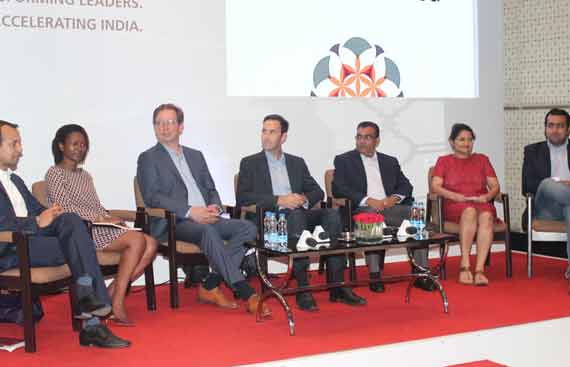Stanford India Dialogue: Charting a Course of Collaboration and Achievement

India and the US have made significant progress in their strategic partnership over the past two decades, with Deputy Ambassador Sripriya Ranganathan urging cooperation and Stanford University students fostering cultural bridging.
Notable progress has been made over the past two decades in discussing the evolving dynamics of the relationship between the world's two largest democracies. Regarding the strategic partnership between India and the United States, the diplomat remarked on the considerable advancements achieved within 70 years. However, emphasizing the unprecedented developments witnessed in the last 20 years, the diplomat asserted that the partnership had reached a pivotal juncture. The diplomat stated confidently that both nations are poised to pursue ambitious goals commensurate with their collective will and capabilities. Deputy Ambassador to the US, Sripriya Ranganathan, articulated this perspective, highlighting the mutual determination to chart a path of even greater cooperation and achievement.
At the Stanford India Dialogue, the Leaders of Tomorrow Conference, organized by the Stanford India Policy and Economics Club (SIPEC) in collaboration with the Motwani Jadeja Foundation, a prominent Indian diplomat, Mr. Ranganathan, delivered a compelling address. He emphasized the capacity to establish ambitious goals and pursue targets that were once deemed unimaginable.
Dr. Anurag Mairal, a distinguished Stanford University School of Medicine faculty member and a pivotal figure in the conference's organization, highlighted the event's significance. According to Dr. Mairal, this marks the first India conference of such magnitude on the west coast. He further emphasized the profound impact of the US-India partnership, declaring it to be the most defining collaboration of its kind for the next three decades.
At present, a collaborative milestone has been achieved, prompting a shared commitment to shaping the global landscape through joint efforts. The objective is to identify areas of convergence and complementarity, facilitating a collective impact. Anticipating the future, the speaker, Ms. Ranganathan, envisions a noteworthy legacy comprising 10 to 15 substantial projects that underscore the collaborative endeavors between India and the United States.
Ms. Ranganathan, a prominent Indian diplomat, directed her message, particularly to Stanford students of Indian origin, urging them to sustain their ties with India. She emphasized the importance of assimilating acquired knowledge and experiences from abroad and applying them in India. This process will contribute to the mutual benefit of both nations, fostering an enduring platform for collaboration.
The second aspect pertains to fostering collaboration. The speaker emphasizes the potential for mutually beneficial partnerships on campus and beyond, encouraging individuals to join forces with friends, peers, and professors in the United States. Pursuing excellence through collaborative endeavors is highlighted as an avenue of exploration that is anticipated to yield substantial dividends in the future.
The third dimension revolves around cultural bridging. The speaker suggests actively engaging in conversations and interactions that involve sharing cultural perspectives and personal stories. The goal is to dispel stereotypes and generate interest in India. The speaker encourages individuals to contribute by imparting knowledge about India's remarkable progress in recent years to colleagues, friends, and fellow students on campus, thus making a significant and positive impact.
India's Consul General in San Francisco, K Srikar Reddy, addresses Stanford University students, many of whom have Indian origins or connections to India. He expresses confidence that the knowledge acquired at this prestigious institution will lead to individual prosperity in the United States and contribute to the broader development of India. Reddy envisions that these students will play an integral role in shaping and advancing the overall progress of India upon their return.
According to Prime Minister Narendra Modi, India is projected to achieve a USD 7 trillion economy by 2030. He has issued a rallying call to all Indians, both within the country and abroad, with a particular emphasis on the youth, urging them to contribute towards India's transformation into a developed nation by 2047. The Prime Minister envisions India reaching a USD 35 trillion economy by 2047 and surpassing the United States economy by 2060. This ambitious outlook anticipates India's emergence as a prominent developed country, with each citizen playing a pivotal role in the nation's economic progression.
During a conference that prioritized student-centered discussions, participants engaged in candid conversations, sharing their sincere perspectives on India's growth trajectory, the evolution of the US-India partnership, and, notably, the actionable steps students can take to participate in these advancements actively.
Asha Jadeja Motwani highlights the significant presence and impact of the Indian diaspora in the United States. With a population reaching five million, she emphasizes that it represents the highest income diaspora within the US system. Motwani underscores the deep connection of the diaspora to the United States, referring to it as their "second motherland" that has bestowed countless opportunities.
Motwani elucidates on the substantial contributions made by the Indian diaspora, noting that despite constituting only two percent of the population, they contribute six percent of the total US taxes. This financial contribution underscores the successful integration and prosperity of the Indian diaspora within the American economic landscape.
Furthermore, Motwani sheds light on the remarkable impact of the Indian diaspora in two pivotal fields, particularly within technology. Silicon Valley, a global epicenter for innovation, witnesses a profound influence from the Indian diaspora, particularly in the Information Technology sector. Motwani provides a notable example by mentioning her late husband, Rajiv Motwani, a Stanford University professor instrumental in developing Google algorithms, thereby contributing significantly to the establishment and success of Google as a prominent tech company.
